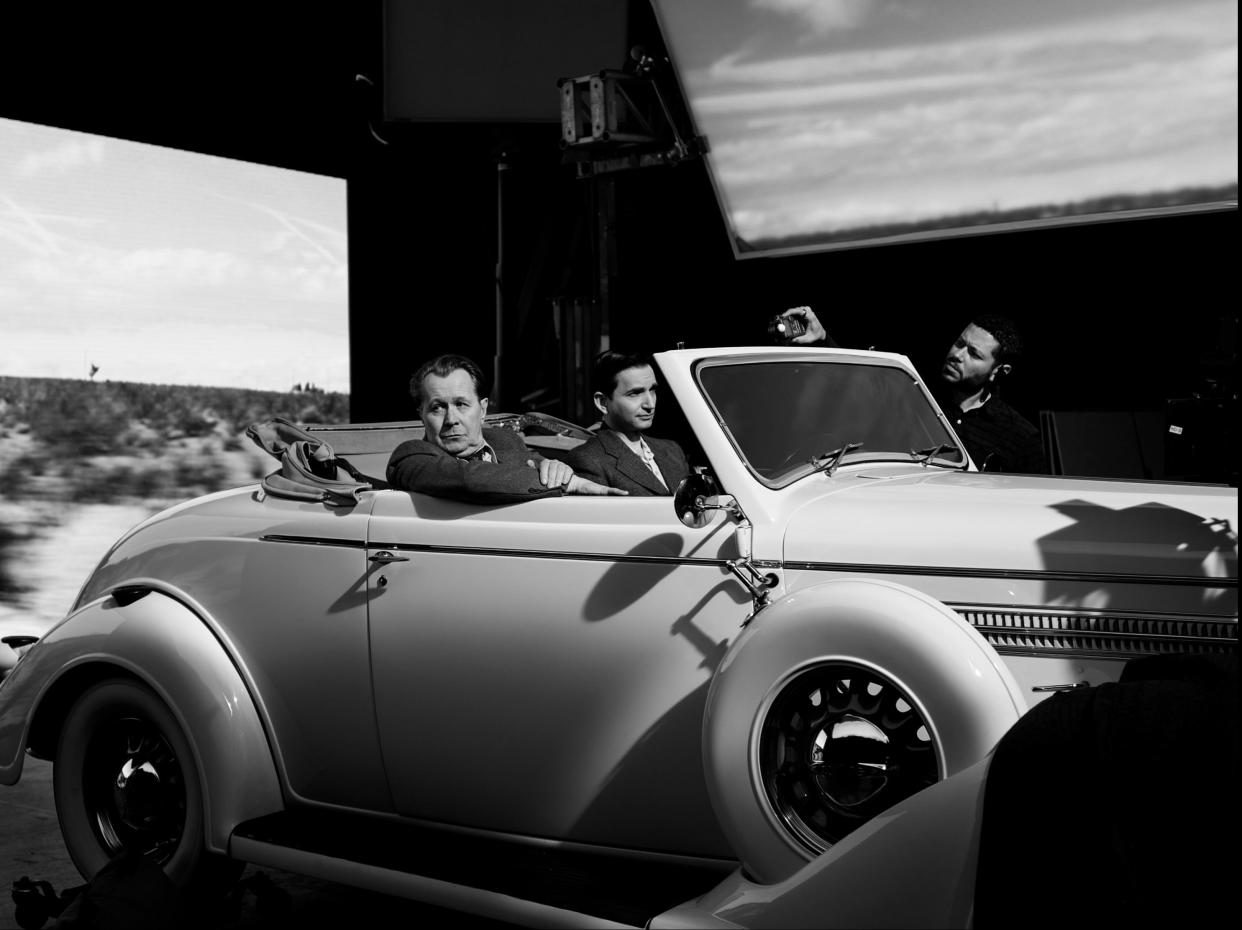Mank review: David Fincher’s sidelong glance at Citizen Kane is a 16 oz steak of a film with pudding after

Dir: David Fincher. Starring: Gary Oldman, Amanda Seyfried, Lily Collins, Arliss Howard, Tuppence Middleton, Tom Burke, Charles Dance. 12A, 131 mins.
Netflix has made itself the place where a director’s dreams can come to roost. There are no box office receipts to fear here. The streaming platform, free to say “yes” to whatever it likes, has responded by greenlighting every unrealised passion project and creative gamble Hollywood has to offer. Sometimes things don’t work out (remember Duncan Jones’s Mute?); other times we get Martin Scorsese’s The Irishman or Alfonso Cuarón’s Roma – sombre, inward-looking epics from directors well into their prime.
David Fincher’s Mank belongs to that second, rarified category. It is bold, heady, rich – a 16 oz steak, with pudding after. The director has taken a sidelong glance at Orson Welles’s Citizen Kane, the jewel of the cinematic canon, by tackling film critic Pauline Kael’s notorious 1971 essay “Raising Kane”. In it, she argues that Kane’s oft-sidelined co-writer, Herman Mankiewicz (here played by Gary Oldman), deserves the lion’s share of credit for its genius. While Fincher, in part, appears to agree with Kael’s position, Mank isn’t particularly interested in hashing out the details. Mankiewicz’s contributions to the screenplay, which won both him and Welles their only Academy Awards, were heavily inspired by his own relationship with media mogul William Randolph Hearst (Charles Dance). Kane, to all intents and purposes, was Hearst. And the character of his second wife, Susan Alexander, could be no other than actress Marion Davies (Amanda Seyfried), Hearst’s mistress.
Mank, though lusciously framed by cinematographer Erik Messerschmidt in black and white, doesn’t feel like much of a love letter to Hollywood. It’s more an indictment of its hypocrisies – exactly the kind of wise but cynical film a director of Fincher’s standing might make, though its script was first written by his late father Jack, in the Nineties, before Fincher had even directed his first film. Mank is wearily in love with the thorny craft of artistic collaboration – a sort of symphonic chaos, as titans clumsily lumber into each other. Mankiewicz and Welles (Tom Burke, who delivers a perfectly serviceable impression) may butt heads, but they maintain a basic respect for their respective crafts.
And yet Mank is at its most incendiary when it steps away from the pen and page, in order to observe the world around Mankiewicz. The Finchers dedicate a surprising amount of screentime to 1934’s Californian gubernatorial race, which saw Hollywood’s rigidly conservative elite rally behind Republican Frank Merriam, in a desperate effort to snuff out his opponent, the socialist Upton Sinclair. Mank strands the leftist Mankiewicz in the middle of this suffocating machine. His ideals have cost him his soul – he’s a broken man now, wrecked by both alcoholism and dismay. Hollywood treats him now as a bemusing little sideshow. What so tortures Mankiewicz is that he knows these people have cast aside their own morals for the comforts of a steady paycheck and a little power. Now, they all sit around on the plump, embroidered furniture of Hearst’s San Simeon estate, sniggering at how “Hitler sounds like a drip”. It’s Mankiewicz who has to remind them of the concentration camps and the book burnings.
Oldman, though brash and poetic, can at times make the character seem like too much of a clown, not a cornered viper. It doesn’t help that, as he swans around, he’s tailed by a line of quiet, capable women – all written to prop up his genius. Mankiewicz was the same age as his wife Sara. But here, with Tuppence Middleton in the role, the age gap feels calculating and deliberate. His secretary, Rita Alexander (Lily Collins), is always draped in light, like an angel come to rescue him. It’s Seyfried as Davies, however, who really walks away with the film, infusing the darling comedian with flickers of fierce intelligence. It’s wonderful when she lets Davies’s star persona slip, letting out a “nerts!” or sitting, wide-stanced, with a champagne bottle propped on her thigh.
Her line readings are fresh and breezy, never beholden to perfect imitation. Fincher, meanwhile, is obsessive in his replication of aged film, with all its scratches and the little burns that indicate a reel needs to be changed. He adopts some of Welles’s own bravado, too – there are flashy montages and wild swings of the camera. But it’s telling that he shot on digital, so that it looks a little too crisp in the daylight. There’s an artificiality to it, a strange kind of self-awareness. Mankiewicz, at one point, declares: “You cannot capture a man’s entire life in two hours. All you can hope is to leave the impression of one.” Mank leaves its mark – in its own way, on its own terms.
Read More
The 40 best original films to watch on Netflix, ranked
The best Amazon Prime and Netflix shows to watch during lockdown


